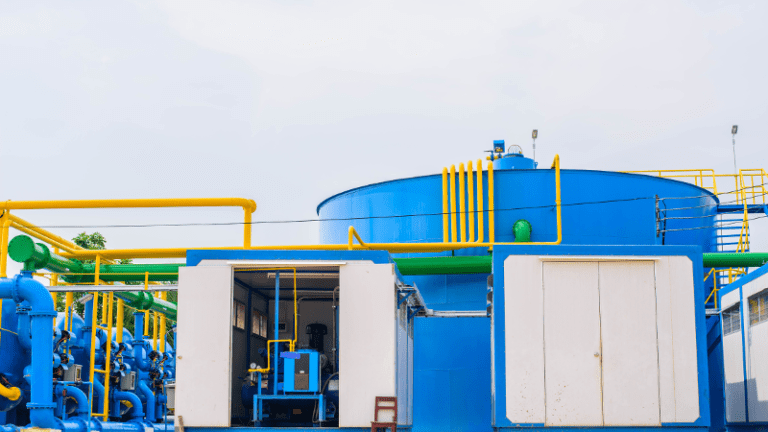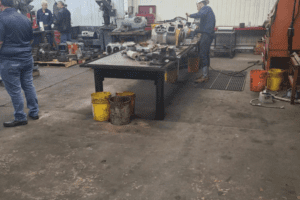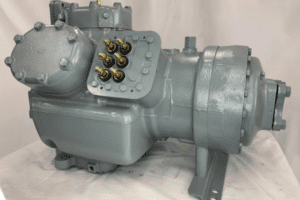If you have an industrial workplace that uses a lot of different machinery, you know just how hazardous waste heat can be. Industrial equipment has the potential to emit an enormous amount of waste heat that can interfere with your operations and your staff members.
Every piece of equipment you can buy is rated to operate within a specific temperature band. But as the workspace becomes more crowded, extra heat can do damage. Internal components and other pieces of equipment in the vicinity are both in danger of wearing out early.
Likewise, the hotter your environment, the more likely accidents become.
Even on a shop floor where everyone follows proper precautions and guidance on PPE, environmental temperatures make a big difference. Endurance and the ability to focus can be compromised. And through all this, you may be absorbing punishingly high energy costs.
For all these issues and more, the industrial chiller is the solution.
What Is an Industrial Chiller?
An industrial chiller is a sophisticated refrigeration system that serves three key functions:
- It lowers the operating temperatures of your industrial machinery
- It keeps the ambient temperature of your industrial spaces cooler
- It reduces the average temperature of your various process fluids
Admittedly, the name “industrial chiller” is a bit of a misnomer. It doesn’t work by chilling air, but by removing heat from the system and transferring it to where harm is minimized. In doing so, it follows familiar principles used by commercial HVAC systems.
Industrial chillers are used across a wide range of industries, including oilfield production and food processing. Injection molding and metal plating are just a few of the processes that give off so much heat; an industrial chiller is often essential to reduce the failure rate.
When strict operational temperatures must be observed at all times, the chiller is indispensable. It helps control output variance during heat-sensitive processes of all kinds. Industrial chillers come in a range of sizes, but most of them depend upon an internal compressor to function.
Operating Principles of Industrial Chillers
Industrial chillers can be designed to operate on the principle of heat absorption or vapor compression. Likewise, they can be air-cooled or water-cooled. No matter the specific details of the system, you will usually need a reliable commercial compressor to keep your chiller working as intended.
There are three categories of industrial chillers in common use today:
1. Vapor Compression Chillers
Vapor compression chillers circulate coolant in pipes through the target industrial processes. Heat from the processes is pulled into the coolant, which then moves on to a refrigerant system. Inside the system, the chiller fluid is actively cooled until it is ready for a new cycle of process cooling.
The majority of today’s most sophisticated electric chillers use this approach. If you are building out a new system, it’s wise to look at vapor compression chillers first. They are reliable, efficient, and most applicable to the majority of industrial workplaces.
2. Heat Absorption Chillers
Heat absorption chillers come with onboard heat exchangers that pull heat away from the target process and dissipate heat to the exterior. They usually use a network of pipes containing coolant. Coolant can come in the form of air, water, or water combined with other fluids.
Heat absorption chillers do not use an onboard compressor. However, they are not as reliable as vapor compression chillers for the vast majority of applications. A compressor gives you much more control over the operation of your chiller and a greater ability to optimize its performance.
3. Water-Cooled and Air-Cooled Chillers
Water-cooled chillers are an option if you have access to an external cooling tower. On the other hand, an air-cooled chiller makes use of ambient air in the environment to reduce refrigerant temperatures. Fans direct the air over refrigerant-filled tubing to eliminate the acquired heat.
Prevent Chiller Breakdown with Remanufactured Commercial Compressors
As with a standard refrigeration or HVAC system, a commercial compressor is a core part of most of today’s best chiller designs. The compressor delivers the mechanical work so refrigerant gas can be efficiently distributed to other components of the system on demand.
The compressor can work harder to pick up the slack when other components of the system aren’t running at peak efficiency, but the opposite isn’t true. Should the compressor break down, chillers require repair or compressor replacement before they return to service.
A remanufactured commercial compressor puts redundancy within reach for your budget. You can purchase the right compressor for your chiller at a fraction of the price – 10%, 20%, or even 30% discounted compared to the cost from an OEM wholesaler.
Don’t risk compressor problems and the skyrocketing failure rates that might apply to your mission-critical industrial processes. Identify a remanufacturing team you can trust to meet your future needs.












